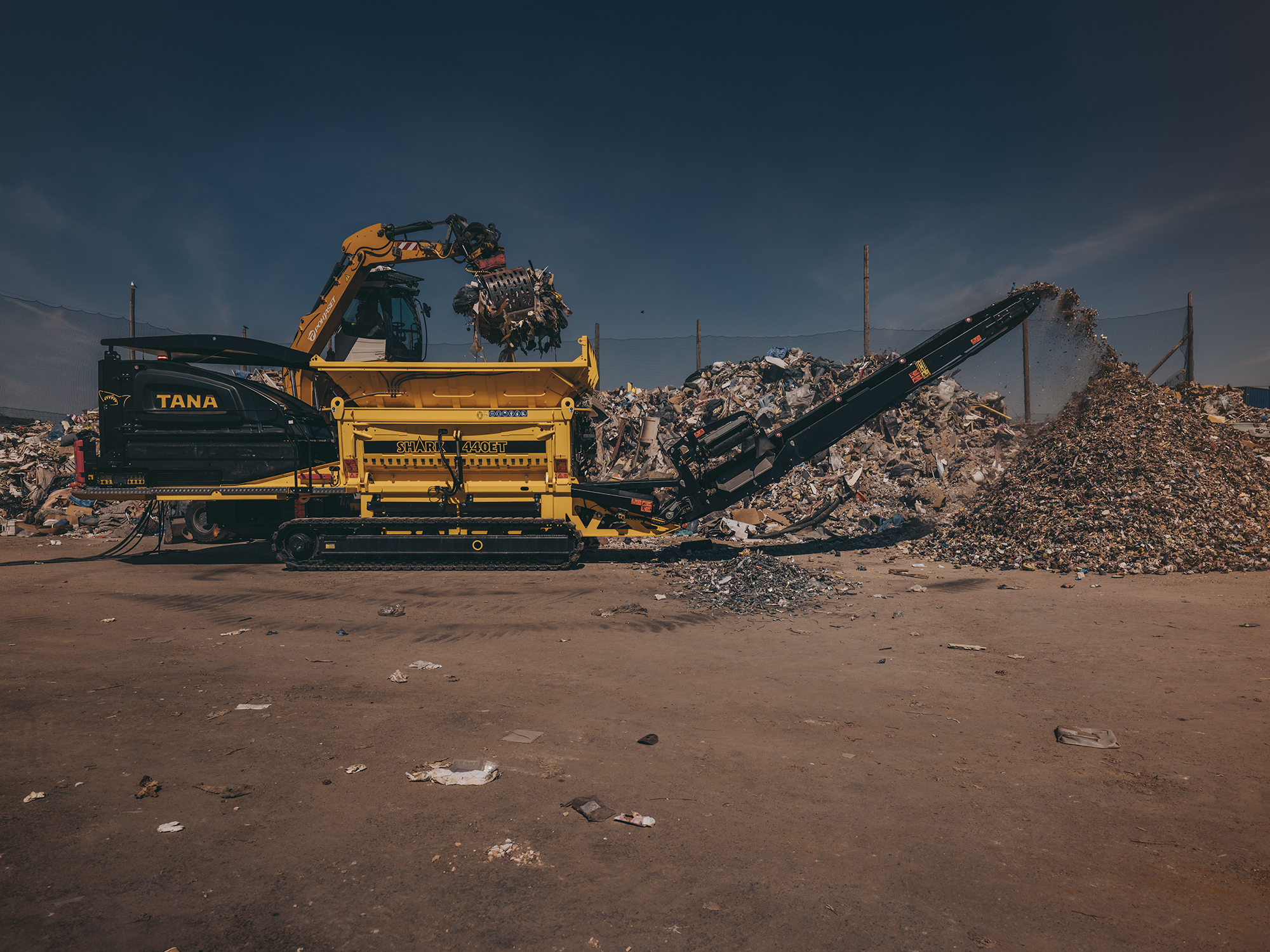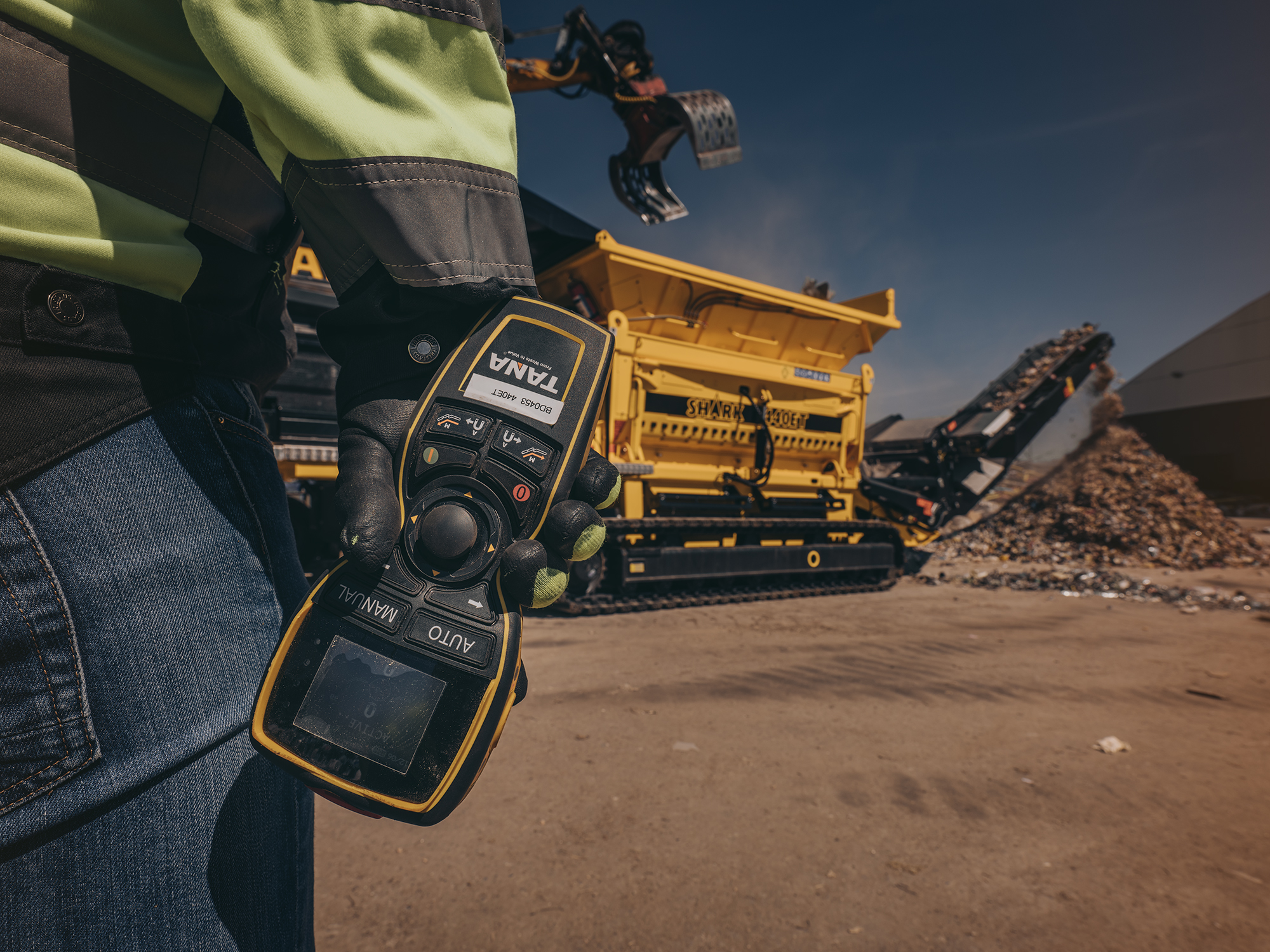The newest addition to the popular and proven TANA Shark shredder series, the TANA 440ET, uses electricity as its power source. Combining the benefits of cheap energy, long service intervals and near-emissions-free operations, the new model helps TANA customers succeed in public procurements and competition within the circular economy.
Soon, it will be possible to process various waste fractions into raw materials for the circular economy in an even more environmentally friendly way. Tana’s newest mobile shredder, the TANA Shark 440ET, shreds waste completely electrically. “Electrification makes it possible to reduce local emissions from waste processing to a minimum. This supports the goals of our customers working at the heart of the circular economy and makes the pre-processing of recycled raw materials and recycled materials even cleaner,” says Eetu Tuovinen, Product Manager for TANA shredders. The TANA Shark 440ET is based on proven technology that has been tested extensively in real conditions. The design of the new shredder is based on the TANA Shark series that was launched at the beginning of the 2000s and whose properties of durability, versatility and mobility have achieved almost iconic status among customers.
The development of the new shredder model was driven by feedback from customers. “Our customers have shown strong interest and a need for an electrically powered and mobile shredder. The TANA Shark 440ET is the first shredder model on the market that combines mobility and electric drive,” Tuovinen explains. Sales to customers will begin at the end of 2023, and the first units will be delivered to customers at the beginning of 2024.

Reliable energy and long service intervals reduce maintenance and costs by half
The TANA Shark 440ET completes the philosophy of the model series, according to which every customer can find a suitability powered and reliable shredder with the optimal performance for their particular operations. The TANA Shark 440ET is ideally suited for high-volume production facilities, where industrial-grade 1000-amp and 400/480-volt three-phase electrical connections are available. “Electrification makes the shredder’s operating costs more affordable than before thanks to longer service intervals. Compared to diesel models, the service interval is twice as long, meaning that every other service is omitted. The spare parts used in maintenance are also cheaper, because electric motors are practically maintenance-free, whereas diesel engines require regular oil and filter changes, for example,” Tuovinen describes.
In recent years, the importance of the circular economy and locally produced recycled materials has also grown in terms of security of supply. A power unit based on diversified and decentralised electricity production supports not only environmental goals, but also the security of supply and predictability of operating costs for customers. Furthermore, the more the electricity production capacity increases, the more affordable the power source is. “Roughly estimated, even at current prices, the operating cost of an electric shredder per hour is just half the fuel costs of a diesel shredder.”

Auxiliary diesel engine moves the electric shredder independently from one workstation to another
The new shredder utilises combined hydraulics and electricity technology, as the electrified power unit powers the traditional hydraulics that then rotate the shredder rotor knives. “The new model shreds all the same materials as previous models. Our familiar and safe TANA technology has simply been updated into a new version,” Tuovinen summarises. Although the shredding itself is powered from the electricity mains, diesel technology has not been completely abandoned. The new electric shredder is equipped with a small diesel engine that allows the machine to be driven independently from one processing point to another at the production plant or terminal. “It is specifically the mobility of the shredder that is important for our customers’ work. Many customers have several different fractions of waste to process in different parts of the yard, and even when the pile of one type of waste grows, it is important to be able to move the machine. The auxiliary diesel engine makes this effortless.”
With the auxiliary engine, the shredder can also be driven to the maintenance facilities at the customer’s own yard or onto a lowbed trailer for transportation.
Electric shredder enables success in public procurement
Electrification is a hot topic in industry right now. The green transition is a global megatrend, as part of which society is becoming electrified. It is also starting to be seen more and more strongly in how the companies that feed the circular economy themselves operate. However, the desire to operate cleanly requires equipment that supports this, Tuovinen points out. “At the moment, especially in Finland and Europe, we see a strong trend in the electrification of process equipment, and the TANA 440ET fits that idea exceptionally well.”
Among sustainable companies, managing their own environmental footprint has already changed from a pioneering attitude to a basic everyday activity. Tuovinen sees that, already in the near future, more and more companies will have to replace old technology with electrically powered process equipment in order to achieve their environmental and carbon neutrality goals. “The industry is already well regulated in Europe, and often public funding is also involved in operations. The regulation of tenders will probably only get tighter, so the local emissions of companies involved in the service chain will also be looked at with a closer eye than before,” Tuovinen concludes.